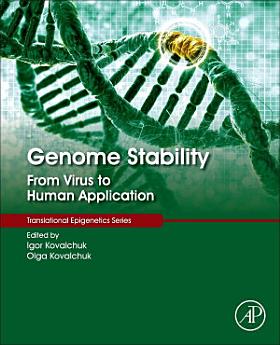Genome Stability: From Virus to Human Application
About this ebook
About the author
Dr. Igor Kovalchuk is the Principle Investigator in the Plant Biotechnology laboratory at the University of Lethbridge. His lab studies genetic and epigenetic regulation of plant response to stress as well as develops various methods for improvement of plant transformation. He is particularly interested in the transgenerational effects of stress and microevolution of plant stress tolerance/resistance.He has substantial expertise in plant stress tolerance and plant transgenesis.
Dr. Olga Kovalchuk is the Principle Investigator of the Human Epigenetics laboratory at the University of Lethbridge. Her lab studies the role of epigenetic dysregulation in carcinogenesis, epigenetic regulation of the cancer treatment responses, radiation epigenetics and the role of epigenetic changes in genome stability and carcinogenesis, radiation-induced oncogenic signaling, and radiation-induced DNA damage, repair, and recombination.





